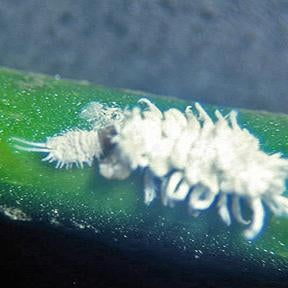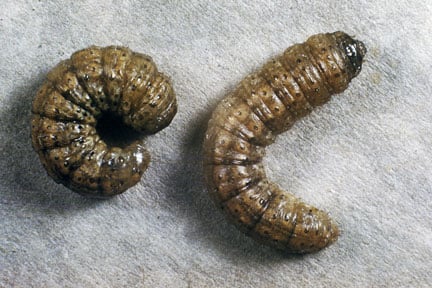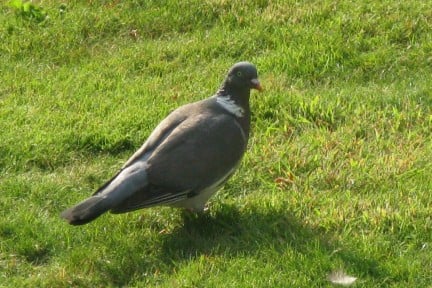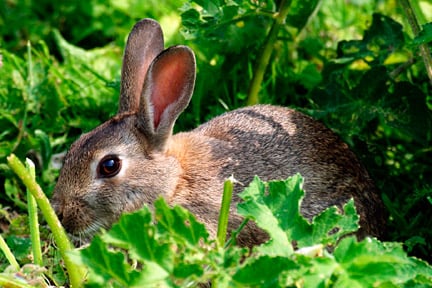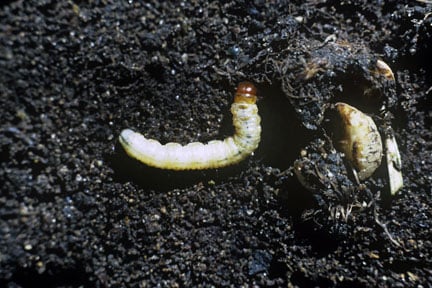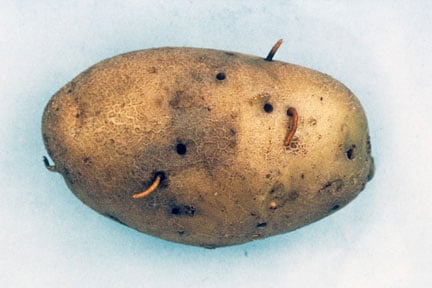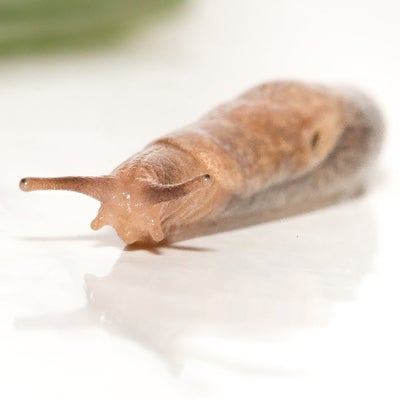
Quick facts
Common name Slugs and snails
Scientific namesArion, Cornu, Deroceras, Limacus and many more
Slugs and snails are beneficial in gardens as many slugs and snails are recyclers, feeding on dead leaves, dung and even dead animals
They are also an important food source for other garden wildlife, including, birds, beetles and reptiles
Slugs and snails are gastropods; a type of mollusc
If you want to minimise slugs and snail feeding on your plants, making changes to your growing practices is the best strategy
What do slugs and snails look like?
Slugs and snails are animals (with no backbone). They are soft-bodied and covered with mucus to stop them from drying out. Their heads usually have four retractable tentacles for sensing the world around them, with the top two carrying tiny eyes. Snails can entirely retreat into coiled shells, unlike slugs, which usually don’t have shells visible. In truth, slugs have much reduced shells; for most species the shells are tiny and hidden out of sight under their skin.
There are over 44 species of slugs and 90 species of snails in the UK. They can be very tricky to identify and need close examination of features such as shell shape, sole colour and mucus colour. You can learn more about slug identification, including handy videos, on our Slugs Count project page.

Are slugs and snails good or bad for the garden?
Gardeners have long thought of slugs and snails as the bad guys, but we are beginning to understand just how valuable they are in the garden ecosystem.
Many slugs and snails feed on decomposing organic matter, such as dead leaves, dung, and even dead slugs and snails. They are beneficial animals to have in a garden as they are a valuable part of the process – that’s why you’ve probably seen them feasting in your bin, helping to turn plant waste into compost for gardeners to use.
So, slugs and snails can be a gardener’s friend and should be welcomed in our gardens. In addition, they are important food for other garden wildlife, such as birds, frogs, toads, hedgehogs, slow-worms and ground beetles.
Only very few species of slugs and snails feed on live plants. In truth, only young and plants they find particularly tasty, such as hosta, are severely eaten. You might consider using some targeted controls in these few cases, or choosing to grow different plants (see below).
Why are slugs and snails a problem?
Some species of slugs and snails feed on live plant material, and this is why gardeners often consider them an enemy. The netted field slug, brown soil slug and common garden snail are some of the species most likely to be found feeding on garden plants.
These species particularly like to eat soft fleshy leaves and , leaving ragged holes made with their rasping mouthparts. The keeled slugs stay mostly underground and can sometimes be found tunneling holes in potatoes and other tubers.
Slug feeding happens at night, so often the holes and slime trails left behind will be the only clues as to who has been nibbling.
Frequently asked questions about managing slugs and snails
Here are our answers to your most common questions about how to deal with slugs and snails.
What makes slugs and snails go away?
Slugs and snails are so abundant in gardens that some feeding is normal. They cannot and should not be eradicated, so targeted management to protect particularly vulnerable plants, such as and soft young shoots on herbaceous plants, will give the best results.
There are ways to try to minimise slug and snail damage:
- Choose plants that are less palatable to slugs and snails, such as woody plants, those with thick or waxy leaves and some herbaceous plants known to be less appealing to them. Check the list at the bottom of the page for a list of more slug-resistant plants
- Transplant sturdy plantlets grown in pots rather than young vulnerable seedlings. Transplants can be given some protection with cloches
- Predators should be encouraged in gardens to enhance a garden’s : some birds, frogs, toads, hedgehogs, slowworms and ground beetles eat slugs and snails
- Torchlight searches can be carried out on mild evenings, especially when the weather is damp, hand-picking slugs and snails into a container. They can then be placed in another part of your garden, such as the heap or areas with less vulnerable plants, or left out for predators to take. However some species have homing instincts so may return to their preferred patch!
- Rake over soil and removing fallen leaves during winter can allow birds to eat slug and snail eggs that have been exposed, but this may make a less welcoming environment for predators and other wildlife
- Water in the early morning rather than the evening as evening watering provide ideal conditions for them to move around at night
Do slug and snail barriers work?
Barriers, thought to repel slugs, include rough or sharp textured mulches and substances considered distasteful or strong smelling but many of these do not have any scientific evidence to prove they are effective. In some studies, copper-based barriers have been shown to repel slugs. A recent RHS study in a garden-realistic scenario found no reduction in slug damage from barriers made of copper tape, , eggshells, sharp grit or wool pellets.
Should I kill slugs and snails?
It’s much better to learn to live with slugs and snails, especially if you have a garden that has the right conditions for them. They will always be present and are a normal part of the garden ecosystem. If you want to protect your most vulnerable garden border plants or vegetable bed, you might want to manage their population using traps or biological control.
Traps, such as scooped-out half orange, grapefruit, or melon skins, can be laid out cut side down or jars part-filled with beer and sunk into the soil near vulnerable plants. Check and empty these regularly, preferably every morning. Proprietary traps are also available from garden centres and mail-order suppliers.
Biological control (‘Nemaslug’) is specific to molluscs, with no adverse effect on other types of animals, and is available as a microscopic nematode or eelworm watered into the soil. The nematodes (Phasmarhabditis hermaphrodita) enter slugs’ bodies, infecting them with bacteria that cause a fatal disease.
- This should only be used in a targeted manner, as it will affect all species of slugs, including the beneficial ones that do not feed on live plants
- The nematode biological control available to control slugs is unlikely to affect snails, as they rarely come into contact with the soil-dwelling nematodes
- To be effective, moist, warm soil – temperatures of 5-20ºC (41-68ºF) – is required. So, spring to early autumn is the best time to apply nematodes. Best results are achieved by applying in the evening to moist but well-drained soils; they may be less successful in heavy soils such as clay
- The nematode is available from refrigerated cabinets in some garden centres or by mail order from suppliers of biological controls (download pdf below)
Should I use slug pellets?
No – slug pellets (even organic ones) have been shown to have negative effects on wildlife in the garden. It’s better to encourage natural predators and use the cultural and biological control methods outlined above.
What plants are less likely to be eaten by slugs and snails?
Herbaceous plants
Acanthus mollis (bear’s breeches)
Achillea filipendulina
Agapanthus hybrids and cultivars
Alchemilla mollis (lady’s mantle)
Anemone × hybrida (Japanese anemone), A. hupehensis (Japanese anemone)
Antirrhinum majus (snapdragon)
Aquilegia species
Armeria species
Aster amellus, A.× frikartii, A. novae-angliae (Michaelmas daisies)
Astilbe × arendsii
Astrantia major
Bergenia (elephant’s ears)
Centaurea dealbata, C. montana
Corydalis lutea
Cynara cardunculus (globe artichoke)
Dicentra spectabilis ( heart)
Digitalis purpurea (foxglove)
Eryngium species
Euphorbia species (spurges)
Foeniculum vulgare (fennel)
Fuchsia cultivars
Gaillardia aristata
Geranium species
Geum chiloense
Hemerocallis cultivars (day lilies)
Papaver nudicaule (Iceland poppy)
Pelargonium
Phlox paniculata
Physostegia virginiana (obedient plant)
Polemonium foliosissimum
Polygonum species
Potentilla hybrids and cultivars
Pulmonaria species (lungwort)
Rudbeckia fulgida
Salvia × superba
Saxifraga × urbium (London pride)
Scabiosa caucasica (scabious)
Sedum spectabile (ice plant)
Sempervivum species (houseleeks)
Sisyrinchium species
Solidago species (golden rod)
Stachys macrantha
Tanacetum coccineum (pyrethrum)
Thalictrum aquilegiifolium
Tradescantia virginiana
Tropaeolum species (nasturtium)
Verbascum species (mullein)
Potatoes
Early potatoes are usually unaffected; maincrop potatoes should be lifted as soon as the tubers have matured. Less susceptible varieties include: ‘Romano’, ‘Pentland Dell’, ‘Pentland Squire’, ‘Wilja’, ‘Charlotte’, ‘Golden Wonder’, ‘Kestrel’, ‘Estima’, ‘Stemster’, ‘Sante’ and ‘Pentland Ivory’.






